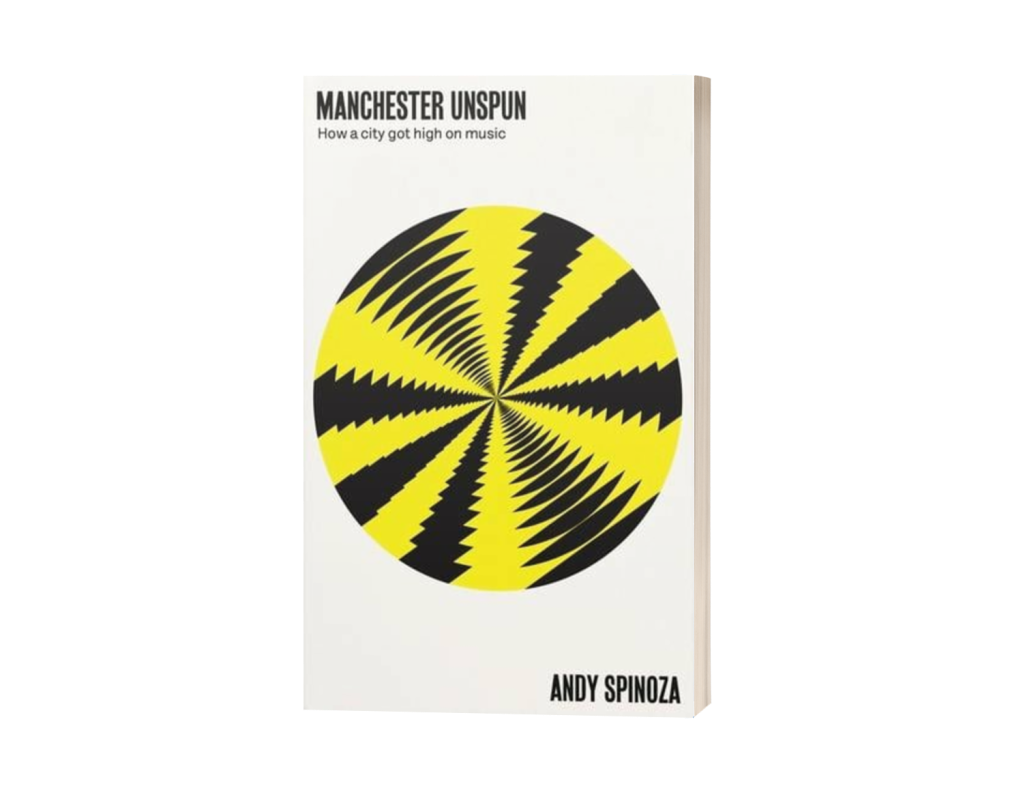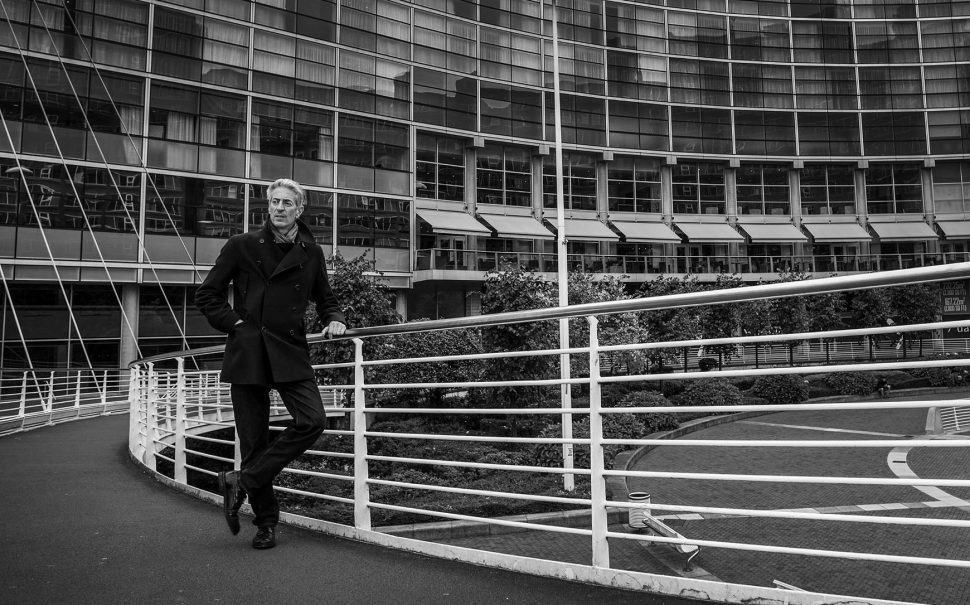There is nobody who has observed the transformation of Manchester more than Andy Spinoza, who has had a front-row seat in the rise in pop culture for the past four decades. From living through the post-punk movement since moving to Manchester in the late 1970s, his work in journalism and later PR ensured that his finger remained firmly on the pulse of the evolution of Manchester’s culture.
And Spinoza has been on the right side of history with the city’s advancements in music, entertainment, arts and culture, and this burgeoning experience ensured he is the best person to provide a detailed and accurate report of this change, which is portrayed in the journalist’s book, Manchester Unspun: How a City Got High on Music.
A chronological, first-hand account of Spinoza’s experiences and opinions, which aren’t shy of controversy, it is a highly informative and engaging read, which isn’t one of those trivial books endlessly pumping out information about Factory Records. Instead, it utilises both of Spinoza’s career paths, journalism and PR. It’s a meticulous observation of Manchester’s change outside of culture, with a specific emphasis on the infrastructure that has taken over modern Manchester.
I met Spinoza on a rugby field in Heaton Moor, the suburb where he now resides, for a dog walk. After briefly meeting him at his book launch, it was apparent that he found a lot of joy walking his lurcher Rudy. My dog, a greyhound called Ellie, was firmly briefed not to sprint off into the abyss and bribed with many dog treats to stay close to me. The moment loomed for my relatively aloof mutt to co-exist with another sighthound for a walk whilst I chatted to Spinoza on the changes he has observed in the wake of his book.
With every astronomical high comes a stinking comedown – something Spinoza doesn’t believe has hit Manchester yet: “I think economically we’re in the high. The number of people living in town and the number of towers projected to be built is 110 over 20 stories by 2030, and that is a sign of success.
“People say Manchester is losing its soul, and a lot of it is based on not liking the aesthetics of the tall towers and the way they seem to celebrate the power of international finance over the heritage of Manchester. The high is continuing, there’s no stopping the towers, and Manchester is spilling out into all directions. So it’s a remarkable and quite extraordinary transformation, which I felt was worthy of a detailed blow-by-blow account.
“There is a good captive audience who want to be entertained, and that growth in the city centre has made the live music scene very viable. We’ve got New Century Hall, Albert Hall, Gorilla, and Deaf Institute, but back then, to have a viable live music place was treasured because they generally didn’t last. Now we’re in a very favourable situation compared to then.”

Since moving into PR in the late 1990s with his company SKV Communications, Spinoza is in a fortunate position to provide a holistic view of the regentrification of Manchester. He has worked with Tony Wilson, Sir Alex Ferguson, Sir Richard Leese and Gary Neville, and in his journalistic work before this, he was truthfully bullish in his reporting of the northern city’s celebs when reporting for Manchester Evening News, The Face and NME.
When Spinoza arrived in Manchester in 1979 as a student from London at 18, he became enthralled and enchanted by the charm the city had, and since has not returned to London. Manchester was still in an industrial slump when the post-punk movement came around. A region which would become synonymous with bands such as Joy Division, The Fall and Buzzcocks was then creating textiles and machinery.
Culturally and socially, there wasn’t anything going for the city, and when Spinoza arrived, that wasn’t a concern for him – he instantly felt the natural charm of the northern city, and has since become an honorary Manc.
“When you’re young and poor, you’re not bothered about comfort or wealth – it’s more about the atmosphere of a place, which Manchester did have. The empty, crumbling buildings were like a ruined empire. So aesthetically, it’s quite thrilling, and no one else wanted to be there apart from young people and artists. It was a very creative place, and it was creativity born out of DIY energy with no great money around but just people doing interesting things.”
That DIY energy which Manchester had in the 1970s and 80s was infectious. A group of creatives had a real attitude to making a living with their surroundings, and in turn, improve it. That DIY energy was encapsulated by Spinoza: rather than moving away from Manchester to London like many other residents in search of better opportunities, he remained within the city and carved out a new northern life, which initially saw him set up City Life magazine in 1983 after graduating, which never missed its fortnightly edition for five years, and in 1988 was absorbed into the Guardian Media Group until its closure in 2005.
“City Life was born out of a frustration of not seeing our tastes, our community and the Manchester we knew reflected in the Manchester news. We figured, quite arrogantly, that we could do something in that area with that DIY spirit,” Spinoza added.
Is that spirit is missing in modern Manchester? Spinoza disagreed, as while it is difficult to replicate with the cost-of-living crisis, “It’s thriving if anything because technology has changed everything. If I was musical, I could create some music and put it out on Spotify and Soundcloud – but the problem is that there is an absolute explosion of it, and I wouldn’t know where to look.”
Like many other books similar to Spinoza’s, they credit Tony Wilson, Factory Records and the Hacienda as the catalyst for the cultural boom in the region. Retrospectively, it is easy to state they were responsible, but from someone who held a Hacienda card since 1983 and constantly integrated himself with Tony Wilson in his role as a diary columnist for the MEN, was that change felt at the time?
“You could feel it at the time that Factory Records, the Hacienda and Wilson were the catalyst for the pop culture revival in the city,” Spinoza affirmed. “You knew that what they were doing was important to the culture of the city. It was a battle for Wilson to be heard by the city council at first, but when Newsweek magazine in the US put the Madchester scene on the front cover in 1990, I think the council woke up to the fact that they had something other cities didn’t. This homegrown culture fascinated Americans, Japanese, and Germans.
“When the Hacienda was threatened with closure by the police, the council lobbied the MP, Bob Litherland, to write to the magistrates saying, ‘This place is important, this is part of the new economy of leisure and tourism, and we need to keep it open’. It was kept open in a very uneasy partnership with the police and the authorities. Still, they started to recognise that the city that once had manufactured cars, widgets and textiles, was now the culture for music and design.
“You’ve got a club which is so synonymous with gang warfare and drugs. A club like that should never exist in a city. But the fact it stayed open is a testament to how culturally significant that was.
“I do have this very high-concept thread throughout the book that Factory Records have made all this money from Joy Division’s royalties and rather than become tax exiles or go to the Isle of Man and shelter their money or go to London – the most horrific option of all – they put their money into this gift to Manchester, this ‘lab experiment in popular culture’, as Wilson called it.
“The money that was made in Manchester was reinvested in the city. They didn’t want to get rich and fuck off. They wanted to resurrect their city through music and culture.”

Manchester’s pop culture is still booming and needs people similar to Wilson and the rest of the Factory Records founders to carry that flame and ensure it remains booming. I threw out a few names to Spinoza in the likes of Andy Burnham and Sacha Lord, but the one individual he firmly believed was making the biggest impact was Simon Moran, managing director of SJM Concerts. “He is massively important. Not only is he probably the biggest promoter in the country, but he’s also got a piece of Co-op Live and has also got a management company that has taken over the management of New Order, Liam Gallagher and John Squire, the Courteeners and Blossoms.”
Regardless of the pivotal players in Manchester’s modern music scene to retain the title of ’Music Capital of the UK’, Spinoza’s admiration for Wilson still rang true 17 years after he passed away. “Some people now, I don’t think have the same cultural drive as Tony Wilson did. He was wilfully wasteful for art’s sake. His philosophy blew the chance that Manchester had to have a Motown Records equivalent because he didn’t care about profit, and it was all about letting artists do crazy things.”
The only formalities left were for Ellie and Rudy to part ways, having somewhat co-existed for the last hour.



